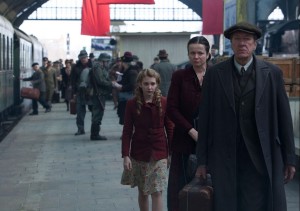Words are very powerful things. You can have the best soldiers on the planet, but the people who topple empires are the thinkers, not the fighters. That brings me on to “The Book Thief,” a nifty little piece that has a lot to say without having the voice to say it. In fact I think that the film’s main problem is that it puts on a thinking cap that was two sizes too big. That’s for later, because all my reviews follow the exact same formula regardless of their superior mediocrity.
“The Book Thief” follows a young, orphaned girl by the name of Liesel (Sophie Nélisse). Her mother was a communist so she had to be given to another family because Nazis and Communists didn’t get along all too well. Liesel is brought into a family with Geoffry Rush as Hans, a loving, caring father and Emily Watson as Rosa, who fulfills the token angry, mean stepmother role. That role is kept up for really only the first act but still, stick to the formula and vent later.
They’re living as happily as you can in Nazi Germany until a Jewish man comes crawling through their door by thename of Max (Ben Schnetzer) after the atrocity of Kristallnacht. Hans owes thisman’s family a favour and has to take Max in and hide him from the Nazis. Max and Liesel bond over a mutual love of books because Liesel is being taught how to read by Hans. The title of the film stems from the fact that Liesel “liberates” books from the library of a wife of a high-ranking Nazi. On top of all this you have a subplot of a child romance with a boy named Rudy and Liesel, more on that later.

This movie really annoyed me, like a smart child doing badly in a test. The potential was there dangling in front of its creators faces but they just didn’t reach it. However, there were moments where I had hope for that child reaching out and actually putting down the right answer. The inclusion of a narration by Death itself, played by Roger Allam – who has a voice that if putting your feet on a sandy beach was a sound, that would be it – even propels the story.
The chemistry between Hans and Liesel is perfect. I’ll say it here, outright perfection in how to portray a human being who cares for their child. The relationship between Liesel and the adoptive mother isn’t so good to begin with. At first I thought the mother was just a token stepmother who hates the child. However, she did grow on me. The development of Rosa was outstanding. I went from wanting her to get a direct hit from a bomb to caring about her as much as Liesel or Hans. The still doesn’t excuse the rushed ending but regardless, I actually ended up caring about those three characters as opposed to rooting for the Nazis. Now, all those things are good but the one stand out piece about this film is its score. The god-tier John Williams absolutely kills it. This man can set the tone perfectly with a single string of notes and can build a decent wall around what would otherwise be a well below par film. The man deserves every bit of credit he has ever gotten.
I’ve been teasing it for the last two paragraphs but now, I have to talk about what I found annoying. The one glaring thing that I found didn’t even affect the film – artistically speaking. In the opening scene they speak German, for the rest of the film they speak English in a German accent that sounds like it was lifted straight from a sketch show. I was sitting in the cinema dumbfounded at how inconsistent it was. While it was annoying, it can be forgiven, considering it didn’t take too much from the film (all the other things did but this one was just small fry).
You can see that this film annoys me, it was trying too hard to be something it’s not and it shows. However, it does have a decent message that I believe to be one of the most important. Words and how we use them may not be the meaning of life, but in the toughest times they can give life the greatest of meanings.
– by Paul O’Connor
1 Comment
I agree with all points a great review.